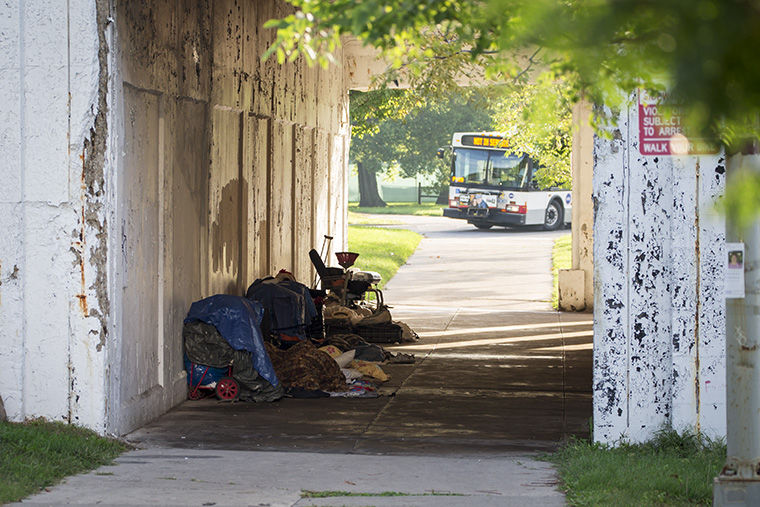CPD ticketing Uptown’s homeless
Viaduct on Lake Shore Drive and Wilson Avenue.
September 28, 2015
Two Chicago police officers were filmed ticketing a group of homeless people in the Uptown neighborhood while patrolling on bicycles Sept. 14 in a video posted to YouTube.
The original video, which now has more than 2,000 views, shows two CPD officers ticketing a homeless man and asking him to disassemble his tent, which they said is against a city ordinance.
Other homeless individuals in the video can be heard shouting at the officers, “Go harass our alderman—he throws our medical records in the garbage!” and “The shelters only keep you for four months, then they kick you out! The only thing we need is some compassion—that’s what we need!”
The incident is one of many recent events involving Uptown’s homeless community. In June, the city led efforts to remove a community of homeless people living underneath viaducts off of Lake Shore Drive near Montrose Beach known as “Tent City.” The viaducts were cleared in June to prepare for a Mumford & Sons concert, and the homeless have not been allowed back to the area since, according to officials.
Ryne Poelker, an Uptown resident who organized a rally in June to advocate for the neighborhood’s homeless community, said homelessness has been a major problem in Uptown since the 2011 appointment of Alderman James Cappleman (46th Ward). Poelker said Cappleman has shut down a number of shelters in the neighborhood and opposed affordable housing developments, pushing out homeless people.
“I saw a lot of the homelessness in the park as a consequence to the things Cappleman was doing to the [single room occupancy] housing,” Poelker said. “During his first term, he closed down two big buildings that had formerly homeless or at risk people living there. He shut those down for the benefit of his developer and real estate friends so he [could] double the rent of those buildings in the neighborhood.” According to 2011 data from The Chicago Coalition for the Homeless, 55 percent of agencies that provide aid in the form of homeless prevention grants ran out of money that year.
Cappleman declined to respond to those charges, but cited the 46th Ward Master Plan, the alderman’s 2013 plan to improve the 46th Ward community, as well as Alderman Cappleman, to explain his strategy for addressing homelessness in the area.
The plan cites the duplication of homeless outreach services in some areas of the neighborhood and a lack of any services at all in other areas as major causes for the prevalence of homelessness. To combat this, it proposed the creation of a single organization that would oversee the delivery of those services to the entire area.
“The long-range goal is to create a system where one case manager is assigned to a single client for the purposes of establishing a trusting relationship, which research shows is more effective with getting people into interim housing within a shorter timeframe,” the plan states.
Poelker said he thinks rather than addressing the issue of homelessness in the area, the city is relocating the population to another area, adding that he thinks the CPD is receiving orders to ticket the homeless from the alderman’s office. He said he thinks said he thinks complaints from Uptown’s wealthier population are driving police to interfere with the homeless community.
“I would imagine that a lot of people that went into that job didn’t do it to harass homeless people,” Poelker said. “Working class residents are more sympathetic to the homeless because they know what it’s like to struggle to provide for yourself. The ones with less empathy are the wealthier residents. They don’t see the homeless as human beings. For whatever reason, they’re not able to look at the issue a little deeper.
” Jose Alicea, a homeless man who has lived underneath the viaducts on Wilson Avenue and Lake Shore Drive for three weeks, said the prohibition of tents in the parks has been the most difficult issue. He said he thinks Cappleman is preventing homeless people from finding safe places to stay.
“I don’t [understand how] he wants us out of the park when we [have] camps and everything,” Alicea said. “We keep it clean, but it’s OK to go under the bridge when we don’t have any camps with us?” Alicea said the biggest help to the homeless would be affordable housing in the Uptown community. He noted his wife of 23 years is having trouble staying at a local church because there is not enough room for herself and their children to sleep under the viaducts near Lake Shore Drive.
“But people do jog by and say good morning to us,” said Alicea. “We say good morning back and what not. Everything is straight. It’ll all be OK.”








